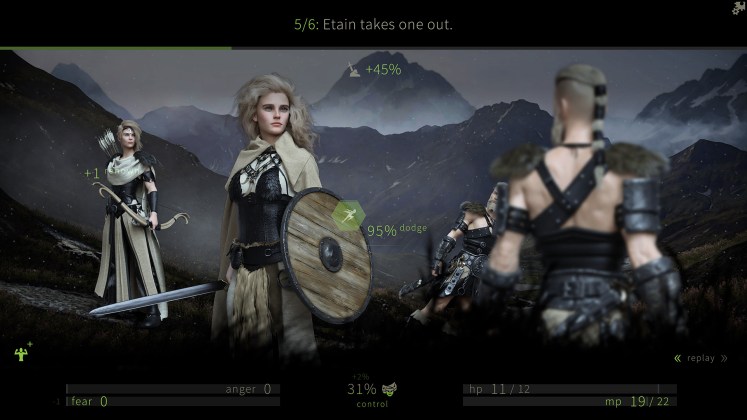“Apart from the sanitation, the medicine, education, wine, public order, irrigation, roads, the fresh water system, and public health … what have the Romans ever done for us?” – Monty Python
Overview
Sacred Fire is a new psychological RPG by Poetic, an indie studio founded by Andrej Vojtas who is the designer, writer, coder, and artist behind the game. It delivers an emotional story about fleeing Rome which progresses through important choices, tabletop-style interactions and turn-based combat. The game was released as early access in October 2021 and at the time of writing the first of three acts is available to play.
Developer: Poetic Studios
Released: 19th October 2021 (Early Access)
Price: £14.99
Platforms: Windows, Mac, Linux
Available on: Steam
Engine: Unity

Narrative
Sacred Fire has the player take on the role of a refugee attempting to flee the Roman empire and allows their actions and choices to dictate how the story plays out and which of the five distinct endings will be reached. Alongside this, there are a number of interesting side characters whose backstories and personalities are revealed as the game progresses, the player’s choices can even impact the NPC’s futures.
The game has a detailed and branching narrative that is well written with engaging storylines. The narrative is action-packed with never a dull or superfluous moment, for example, in the first chapter alone players can go on a deer hunt, reunite with an old friend, confront a bully and have a run-in with some Roman soldiers! The majority of the story is delivered via narration and dialogue but there are also other narrative devices at play such as memories and insights about other characters that can be discovered. These add depth to the story and aid character development.

Gameplay
Sacred Fire’s gameplay is made up of a number of different components, luckily the game begins with a pretty comprehensive tutorial: the slight downside being that the player is a bit bombarded with information at the start of the game. Essentially the player goes on a choose-your-own-adventure with dice rolls to determine the success of the choices made.
One of the more original elements of Sacred Fire is the psychological side of the game. Events, dialogue and actions can influence the player’s fear and anger levels which in turn will impact the success chance of dice rolls connected to available choices. Whilst the protagonist’s control will increase as the

There are two types of dice checks, hard and soft. Choices displayed as text are soft choices and can be attempted 3 times, though failure can trigger fear or anger and decrease the success chance of subsequent attempts. Hard checks are displayed as symbols with text and players get one attempt at a successful roll. A risk chain is a series of hard checks and comes with a risk chain bonus that can be affected positively or negatively by things such as injuries, character motivation and results of the previous risk chain. Combat also consists mainly of hard checks with failure sometimes being fatal.
There are a number of complex systems at work in the game, including the character’s stats and development. The player character’s info can be found across four tabs, outfit, mindset, renown and people and each features the ability to improve or gain knowledge by spending different types of currency that are earned during gameplay. The mindset tab, for example, shows the subconscious ideas of the protagonist as they are gradually brought to the surface through the events in the narrative. These notions include things such as ‘I am not in control’ and their influence can be minimised or exaggerated by spending experience points. Player actions can influence the attributes of the protagonist too, seeing something like ‘+1 addiction’ or + ‘1 empathy’ next to a choice is not uncommon.

Styling
Sacred Fire’s visuals are made up of detailed artworks layered to create a static scene with little to no animation. The individual characters and backgrounds are well made and have a nice painterly realism aesthetic but there is quite a bit of repetition in their use. For example, all of the Roman legionnaires look exactly the same, as do the slavers. Similarly, there is only one image for each character so rather than be in different positions such as ducking or falling as described, the picture of the character standing upright is placed in the scene at a jaunty angle. The level of simplicity does break the immersion to a degree but it is possible that this, along with minimal cosmetic character customisation options, is due to the game being in early access and that more artwork will be added.
The music is very atmospheric and ranges from energetic, tension-filled songs that build strings and drums into a dramatic crescendo to slow emotive numbers featuring beautiful vocals. Much like the artwork, there are a limited number of tracks but they are implemented in such a way that they do not feel repetitive. The voice acting, which includes narration by Doug Cockle who voiced Geralt in The Witcher franchise, is particularly noteworthy and really helps bring the game to life.

Summary
There are many facets to Sacred Fire’s gameplay and while it seems complicated at first it is straightforward enough to hook players quickly and not feel overwhelming. It is engaging in a variety of ways and features a well delivered and action-filled narrative and intricate character development. The audio aspects are a highlight but the visual aesthetics feel a little lacklustre in their current state, however, I remain hopeful that this will be addressed in future updates and commend the solo dev for creating such a well rounded and comprehensive experience. Sacred Fire is an exciting, original and very accessible game that I am happy to recommend to fans of the genre and newcomers alike.
For more historical games, check out:
Svoboda 1945: Liberation – Brukel
Or for more dice-based antics take a look at:
Lost in Random – Dicey Dungeons – Here be Dragons


